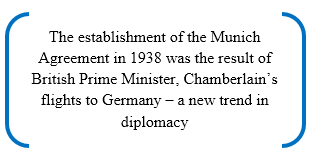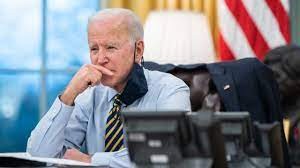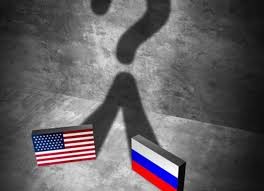Hemant Adlakha, Honorary Fellow, ICS

Source: diplomacy.edu
Abstract
“No-show” in Alaska and naked hostility with Moscow at feverish pitch are raising a big doubt about what President Biden said in his State Department address: “Diplomacy is back at the centre of our foreign policy”. If Biden chooses to hold a bilateral summit on the sidelines of the upcoming Earth Summit later this month, as is being speculated, who is it going to be with – Xi or Putin?
Do bilateral summits in diplomacy mean anything anymore? As the Biden administration tries to revive the “American leadership” in the world by signalling “the end of the Trump interregnum, it is largely relying on multilateral and summit diplomacy to achieve the goal. In order to win back trust of its major allies and partners, President Biden has been bellicosely reiterating his “America is back” rhetoric. At the same time, following a spree of virtual foreign policy appearances from Munich Security Conference to G7 to more recently Quad leaders’ summit, “statesman” Biden is now desperately wanting to hold a summit diplomacy with the leader of a major country – not an ally or a friendly leader. The purpose will only be served if a bilateral summit is held with a competitor nation or with an “enemy” power. The sooner it is done, the better. The White House admits its heightened expectations for Biden-Xi summit if the Alaska talks were productive.

Following the World War II, summit diplomacy or conference diplomacy between heads of government became the “New Normal” as the advent of new technology accelerated the tempo of diplomacy. The practice of world leaders calling each other on telephone in the 1930s was epitomized as “hot line” by the Soviet and American leaders. The establishment of the Munich Agreement in 1938 was the result of British Prime Minister, Chamberlain’s flights to Germany – a new trend in diplomacy. Taunting “air diplomacy” of the leaders of the colonial and imperialist powers in the West during the post-war decades, a Ghanaian diplomat once remarked, “Radio enables people to hear all evil, television enables them to see all evil, and the jet plane enables them to go off and do all evil.”

Image: President Biden awaits Xi or Putin?
Source: moderndiplomacy.eu
But summit diplomacy entails risks too. A point well-articulated by the Burgundian diplomat Philippe de Commynes six centuries ago: “Two great princes who wish to establish good personal relations should never meet each other face to face, but ought to communicate through good and wise emissaries.”
Trump-Kim summit diplomacy not too long ago, ridiculed by the Democrats as “treason,” serves a good example. Surely, neither Trump (obviously) nor Kim Jung-un (not expected of him) had enough intellectual resources to be aware of the wisdom left behind for modern day diplomacy by the 15th century diplomat and chronicler cited above. Yet even most bitter critics of President Trump’s foreign policy enthusiastically welcomed the prospect of a Trump-Kim first summit in 2018, despite being fully aware the outcome would least lessen (nuclear) tensions on the Korean peninsula. Why? “It’s delightful to watch Donald Trump discombobulate the bipartisan American national security and foreign policy establishment with his impulsive assent to talks with DPRK leader,” is what Jim Kavanagh, the editor of The Polemicist wrote within days after the news of Trump-Kim summit was first made public.

The other good example of risks involved in face-to-face diplomacy, as Philippe de Commynes had warned, is the “2+2” meeting in Anchorage, Alaska between the top “pair” of emissaries of the worlds’ two largest powers two weeks ago. Too much has been already been written on the frothy exchange which was everything but diplomatic for us to chew. For the early reactions on the no-show in Alaska, my two articles – one a couple of days before the talks and one a day after the opening day talks – reflect the heightened tensions produced and not abated by the dialogue in Alaska.
Perhaps, a bigger setback entailed in the anti-climax at Alaska was the dashing of all hopes of much anticipated possible virtual Biden-Xi summit on the sidelines of the upcoming Earth Day global leaders gathering on April 22. “Beijing is seeking a meeting between Joe Biden and Xi Jinping next month if the first high-level U.S.-China talks in Alaska starting Thursday are productive,” a Bloomberg report claimed while the two-day high-level diplomatic tete a tete was still being held in Anchorage. A similar claim was made by VOA news on the eve of the dialogue to be held in Alaska. “U.S. President Joe Biden could meet virtually with Chinese President Xi Jinping as early as April 22, as Biden hosts the ‘Global Leaders Climate Summit’ in Washington on Earth Day,” speculated Nike Ching of the US largest broadcaster.

Source: nytimes.com
Yet the optimists in Beijing welcomed the Alaska outcome and called it “testy opening dialogue”. “Although Antony Blinken was very blunt in talking about a fight between rivals, he did not officially single out China,” observed Professor Shen Dingli of Institute of International Studies, Fudan University, one of China’s globally most respected US affairs watchers based in Shanghai. “The two-day, three-session talks did yield more than symbolic deliverables. Such frank exchanges of dissatisfaction could well become the new normal between China and the U.S.,” Shen Dingli commented.

Who will Biden choose to hold bilateral summit first? A summit with Iran is ruled out at the outset. For two reasons – Biden’s decision to bomb Syria and Team Biden’s condition that Tehran returns to compliance with JCPOA or the Iran deal, i.e. limitations on its nuclear development. Summit with Kim Jung-un was out of question even before Pyongyang fired two ballistic missiles into the Sea of Japan last Thursday – the first such violation of ballistic missile test ban since Biden became the US President. Two additional reasons are: the DPRK vehemently opposing the US-South Korea joint military exercises; the North Korean refusal to denuclearize without the US first committing to not using nuclear weapons against Pyongyang.
This leaves Biden to choose between Beijing and Moscow. Norman Soloman, who founded the Institute of Public Accuracy in Washington a quarter of a century ago, has appealed for an urgent Biden-Putin Summit in an article last Tuesday. “The spate of mutual denunciations is catnip for mass media and fuel for hardliners in both countries,” Soloman wrote. The urgency in Soloman’s appeal has arisen from the recent outbreak of rhetorical hostilities between White House and Kremlin thanks to Biden’s undiplomatic remark of calling Putin a “killer.” To which Putin replied in his characteristic style, saying “It takes one to know one.” Interestingly, in Moscow’s assessment the Biden remark confirms “He [Biden] doesn’t want normalization” with Kremlin. In other words, this implies no prospects whatsoever of an early Biden-Putin summit.

Source: asia.granthshala.com
On the other hand, despite no-show fiasco in Alaska, there is more than one reason to expect a virtual Biden-Xi summit on Earth Day next month. First, as Professor Shen Dingli, cited above, said: “According to the post-dialogue statements of both sides, Beijing and Washington have agreed to set up a joint working group on climate”. Echoing similar sentiments, senior US officials have described the need for the world’s two largest carbon emitters to cooperate with each other on climate change as a “critical standalone issue”. Second, although ruling out that China is in any kind of hurry to hold summit meeting with Biden, Professor Cui Lei of influential think-tank, China Institute of International Studies, agreed on the likelihood of a virtual summit between the two leaders on climate change: “When positive achievements in these areas take place, there will be ample reason for the two heads of state or senior officials to meet,” Third but not the last, following the appointment of John Kerry as the US Special Envoy for Climate, China followed suit and brought back its most well-known environment official Xie Zhenhua from retirement as special climate envoy. Xie, China’s chief negotiator for the Copenhagen Accord or COP 15 has been described by friend Kerry as “environment man, not geo-politics man.”
Finally, oblivious of the warning by Philippe de Commynes, and going by all positive indications in the spirit of Biden’s earlier remark during Chinese Lunar New Year telcon with Xi on areas of convergence of interest between the two competing powers, Biden and Xi virtual summit in April or in Singapore’s “Davos” WEF from May 25-28 may not promise anything but will be a welcome move to just ease tensions by “opening champagne and celebrating via the internet”. Or, as they in Chinese: “ganbei!”
This is revised, updated version of an earlier article “Biden’s Summit Diplomacy: Who will he choose first, Xi or Putin?” published in Modern Diplomacy on 2 April, 2021.